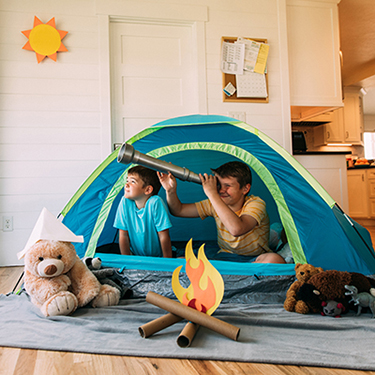How Much House Can I Afford?

When you’re thinking about buying a home, home loan experts can guide you through the process. They’ll help you consider the major factors that lenders look at during a preapproval:
- Your income — This includes your salary, bonuses, commissions, and other passive income from investments or rental properties you own.
- Cash reserves — The amount of money you have on hand to make a down payment and cover closing costs, including savings, investments, cash value of life insurance you own, and other sources are part of your reserves.
- Debts and expenses — Your debt-to-income ratio is a big factor, so lenders look at your monthly financial expenses, including utilities, insurance, loan or credit card debt, car payments, and other fixed monthly expenses.
- Credit score — Lenders look at your credit score as it’s a good predictor of your reliability to make your mortgage payments.
Once you’ve gathered this information, use online mortgage calculators to estimate the loan amount and monthly payment. Keep in mind that these are only estimates and are of no value to a seller, but they can help determine your desired price range. Texell’s Mortgage Loan Officers can also walk you through the preapproval process. Visit TexellHomeLoans.com or email Mortgage@TexellHomeLoans.com to get started.
What Are Lenders Looking For?
If you’re looking to buy your first home, lenders look at your finances to determine what type of loan works best for your situation. The most crucial ratios to consider are the debt-to-income and the monthly mortgage payment-to-income.
Your debt-to-income (DTI) is the primary method to determine your maximum loan amount. Lenders look for less than 36% of your income going to pay your debt. The payment-to-income ratio is how much of your income is going toward your monthly mortgage payment. Lenders want your monthly mortgage payment to be less than 28% of your monthly gross income. However, financial advisors recommend a more conservative monthly payment ratio of less than 25% of your income after taxes.
When evaluating your loan application, underwriters not only look at these ratios, but they also examine these documents:
- Current employment with W-2 or 1099 statements from the last two years.
- Income statements, including last two months’ paycheck stubs.
- Financial statements from your credit union or bank from the last two months.
- Any recent debt that you’ve acquired.
- Tax returns from the last two years.
If you do not receive loan approval despite meeting the DTI and payment ratio thresholds, talk with a home loan expert to improve your financial readiness.
How Much is Required for the Down Payment?
Lenders and financial advisors recommend a down payment of 20% of the purchase price for your new home. Creditworthy borrowers can achieve the dream of homeownership with less than a 20% down payment but may be required to pay Private Mortgage Insurance (PMI). Included in the monthly mortgage payment, PMI costs between 0.5% and 1% of the annual mortgage. Learn more about PMI in “What is Private Mortgage Insurance?”
Texell’s First-time Homebuyer program helps achieve homeownership with lower monthly payments and no private mortgage insurance1. This loan also allows down payments as low as 3%2, and gift funds are accepted for the down payment or closing costs3. Learn more at TexellHomeLoans.com.
Factor in Your Closing Costs
When you’re ready to close on a loan, be prepared for closing costs, which can be anywhere from 3 to 6% of the value of your home. The mortgage loan officer provides an estimate and Closing Disclosure at least three days before you attend your closing. The Disclosure includes:
- Application fee
- Appraisal fee
- Home inspection
- Prepaid interest
- Government loan fees (if applicable)
- Property taxes
- Homeowners insurance
- HOA fees
- Other fees that could include attorney’s fees, origination fees, and title search fees.
Your specific closing costs will depend on the type of loan you have, the value of your home, any seller concessions or closing costs they agree to assume, and your state’s laws.
Other Expenses of Home Ownership
Once you’ve calculated how much house you can afford along with your closing costs, you’ll need to consider other expenses of owning a home:
- Property taxes
- Homeowners insurance
- Flood insurance, if required
- Utilities like trash pickup, water, and sewer service
- Homeowners Association (HOA) Fees
- Repairs and maintenance
- Additional convenience services like pest control, yard maintenance, and pool cleaning (if you have one)
Learn more about these expenses and how they add to your monthly mortgage in “4 Expenses Added to Your Mortgage”.
Buying Your First Home? Texell Can Help.
When you’re ready to buy a home, Texell’s Home Loan Heroes are ready to help you open the door to your new home. Our mortgage team assists with many loan types including First-time Homebuyer and other low down payment options, conventional, VA, FHA, USDA, land, and jumbo. When you’re ready to get started on the journey to homeownership, visit Texellhomeloans.com or call 254.774.5104.
NMLS# 460152
1 With approved credit. The First-time Homebuyer program is available for single family residence where at least one of the homebuyers is a first-time homeowner, and homebuyer education is required. Must have a minimum 700 credit score and loan amount cannot exceed $500,000. Other restrictions may apply.
2 If loan-to-value is greater than 80%, borrowers must contribute at least 3% verified personal funds.
3 Gift funds may fund all or part of the down payment or closing costs.
If you wish to comment on this article or have an idea for a topic we should cover, we want to hear from you! Email us at editor@texell.org(opens in a new window).







